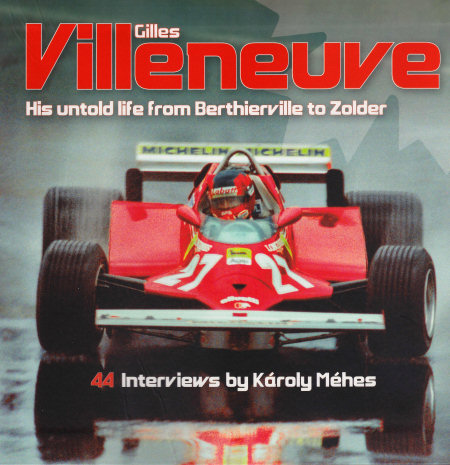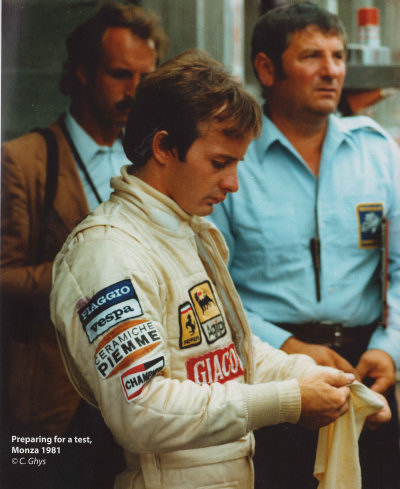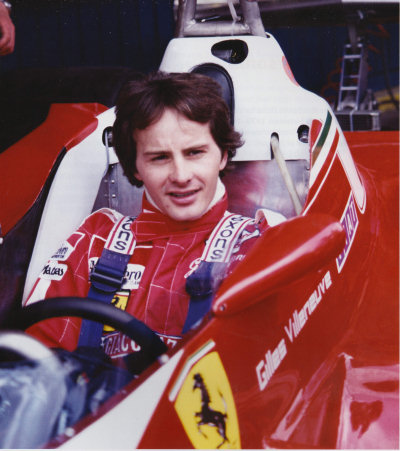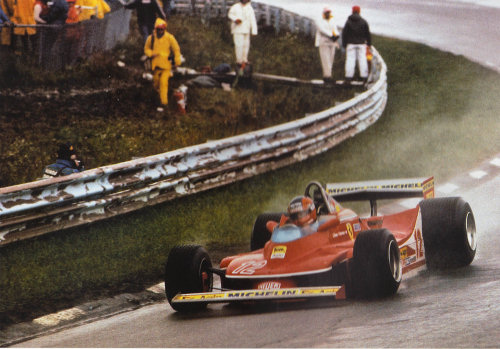The Way It Is/ The Villeneuve legend lives foreverby Gordon Kirby |
 One of my warmest pleasures of the holiday season was reading Karoly Mehes new book about Gilles Villeneuve. Mehes is an unabashed fan of Villeneuve and his book is a labor of love. It comprises interviews with 44 people who knew or worked with Gilles--fellow drivers and teammates, Ferrari team personnel and a brace of Formula 1 journalists and photographers plus others whose paths crossed at some stage with the legendary, big hearted little man from rural Quebec.
One of my warmest pleasures of the holiday season was reading Karoly Mehes new book about Gilles Villeneuve. Mehes is an unabashed fan of Villeneuve and his book is a labor of love. It comprises interviews with 44 people who knew or worked with Gilles--fellow drivers and teammates, Ferrari team personnel and a brace of Formula 1 journalists and photographers plus others whose paths crossed at some stage with the legendary, big hearted little man from rural Quebec.
Mehes's book also features plenty of excellent photographs but the book's greatest strength is that it captures Villeneuve's warm personality and unsophisticated but open mind. He was a first class human being as well as a tremendous racing driver and this week I've skimmed the surface of Mehes's book to excerpt some comments from a selection of Mehes's 44 interviews that reveal Villeneueve's true character and personality. I'll start with Bobby Rahal who raced against Gilles in Formula Atlantic from 1974-'77. "Gilles always drove as if each lap was his last," Rahal says. "He had tremendous car control and he relied on that. I don't know if he had any other pace than flat out! He drove many great races in F1, notably the 1981 Spanish GP, where in a car that shouldn't have won, he did so. I don't ever remember Gilles driving 'angry' because of something someone did in the race, but he was willing to take great chances for even a lesser placing." Marco Piccinini, Ferrari's Sporting Director, 1978-'88.  © Karoly Mehes/R. Murphy Mauro Forgheiri, Ferrari's Technical Director, 1962-'85. "Gilles is still the most popular driver in the world. I remember the fight with Arnoux (at Dijon in 1979) which was a classic. The fans liked his approach and he even made them mad. So many years after his death he is still considered as having real greatness. Gilles' enthusiasm also created great enthusiasm in the team and his fans. He had such a huge natural strength that implanted faith towards him in everybody." Antonio Tomaini, Gilles' race engineer at Ferrari. "I was surprised at how thin and small that boy was. He seemed almost inappropriate for the job. But it was not difficult to change my mind once I saw him in action: he drove like crazy! "At Mosport (in 1977, his Ferrari debut) after every outing he came back to the garage with something broken, first a spoiler, then a wing, then smoking brakes and a smashed wheel. He always had the most relaxed expression on his face while he described what had occurred. He never tried to find an excuse or justify the condition of the car when he brought it back. To him it was logical behavior. "Everyone, including his fans were elated with him. He made the number 27 the most loved and followed F1 car in the world. He was always fast and scrappy even when there was something wrong. He was not a fool at all. He had so much fun doing his job. It was his passion. "During the race he did not care if he was last or first as long as he could go as fast as possible and overtake whoever was in front of him. As long as he could manage to stay on the track there were always some surprises to come from him.You could never get bored with Gilles! "I'm not sure he would have been able to win the Championship, but who cares, he was a champion just because of his way of doing things. Mr. Ferrari was one of his biggest fans and always found an excuse for every breakdown or incident. He usually said if the car could resist Villeneuve that was huge proof of the car itself. Actually, the car's abilities did not matter because Gilles always did the best to make it faster." Sergio Vezzali, Ferrari mechanic, 1958-'93. Vezzali was Villeneuve's chief mechanic during Gilles's five years with Ferrari. "He didn't care much about the car. He got inside and wanted to push it to its limits and that was that. When he did his infamous drive in Holland in 1979, when he came back to the pits on three wheels after his puncture he first wanted us to fix the rear suspension because he wanted to go back to the race! It was of course impossible.  © C. Ghys "Something else you surely most know: Gilles did many crazy things with his helicopter. He used to fly very low in Maranello which was frightening. Only a few know he once landed on a military base not far from here. It caused an alarm to go off and a military fighter jet was sent to check the situation... Crazy, as I said. "Today if you have success it is 90 percent the car and 10 percent the driver. In Gilles' case it was sometimes the opposite: 10 percent the car and 90 percent the driver. That is what makes him a legend." Carlos Reutemann, Ferrari's number one driver in 1977 and '78. "He was a very nice guy. He was a bit shy coming from the north in Canada. What I appreciated most was he was the first driver to come to the races with a caravan bringing all his family with him. I had a nice time with Joanna and the children. It impressed me how they behaved around the races while Gilles did his job in his Ferrari. "His crashes could have been trouble for him, but Enzo immediately fell in love with Gilles. When Gilles was in Maranello he spent a lot of time in Mr. Ferrari's office. I think for Mr. Ferrari, Gilles was really a kind of son figure, he loved him so much. I can't imagine him ever having any questions about Gilles' accidents. He didn't care how many accidents Gilles had." Jody Scheckter, Ferrari teammate in 1979 and '80. World Champion in '79. "Even though it was hard, both of us always remained very honest with each other. We got on well and had some great laughs. We joked around a lot and had a lot of fun but we also worked together very hard." Patrick Tambay, F1 driver and two-time Can-Am champion who was a close friend of Gilles and drove his #27 Ferrari in 1982 after Gilles' death. "I was very impressed by the honest behavior of Gilles and his straightforward attitude. He gave his friendship so openly. He always had a big smile. He simply trusted people he came in contact with. "Even when we didn't see each other that much, he always shared opinions about different things. He didn't change much at all. Maybe he was a little bit more mature, more serious, not smiling as much. He got more involved with his role as a leading driver for Ferrari. Our relationship always remained the same: open and close." Rene Arnoux, Ferrari and Renault F1 driver who famously dueled wheel-to-wheel with Villeneuve at the French GP in 1979. "We had a good feeling for each other immediately. I always considered him my best friend in Formula 1. In a nutshell, the name Gilles Villeneuve always symbolized for me a real acrobat behind the wheel. He drove at the limit at each corner, each bend, always. Gilles didn't understand the meaning of the word danger. One time he said to me, 'Rene, if you have a steering wheel and brakes, you can achieve everything!'  © Ferrari "After the race everybody said that these two guys were like boxing. On the podium Gilles and I shook hands. We had big smiles on our faces. We were both exhausted. "As I said, we were always good friends. After Dijon we somehow remained together and for the longest time people talked only about what happened at Dijon. I would say our friendship became even stronger." Mario Andretti, 1978 F1 World Champion among many other accomplishments. "Gilles was very aggressive, no question about it. You only had to watch him and you could easily see he was extremely aggressive. When he was hired by Ferrari, they probably didn't expect this. Still, Mr. Ferrari kept him on despite the fact that Gilles destroyed his cars. Mr. Ferrari loved his heart, the way he applied himself, how much he wanted to win and be successful, sometimes in a destructive way, but that was his way. As time went on you got to appreciate that he was giving a hundred percent all the time, and there is something to be said for that. "I never had any problem with him whatsoever. As a matter of fact, at Monza in 1978 when he and I were first and second and were penalized after the race (for jumping the start), I was having some brake problems and stayed behind him. Two laps from the end I took a big risk. I tried to overtake him under braking going into Ascari and he acted very correctly. He did not close the door on me as he knew it would have been a big crash. I don't know if he was aware of my braking problem but I appreciated that he used good judgement. "I can tell you I didn't have any issues racing against him. Yes, he was aggressive, but he was not an idiot. He was intelligent and a very good all round racing driver. He had huge talent. "As an individual, Gilles was a dear, dear guy. He was very likable. He was a free spirit. He was always smiling. I liked Gilles very much." Brenda Vernor, Enzo and Piero Ferrari's secretary. "Everyone loved Gilles. When he died, someone, a fan of course, wrote in the middle of the road outside the Ferrari factory, 'Gilles forever, we love you.' If you go to the road which leads to Fiorano, a road which is named after him, you will find a monument to him. Every day someone places fresh flowers on it. I think he was one of the most loved drivers we ever had." Pino Allievi, renowned Italian racing writer. "Gilles was an uncomplicated guy, often almost timorous in his connection with the press. On the other hand he was always available. Very much different from today's drivers.  © Allan de la Plante "Villeneuve began to understand only in 1982 how much patience would be needed from him to become World Champion. He could have won it in 1979, but he wasn't mentally mature enough for it. "Villeneuve became an Italian idol not only because he defied logic but--as a metaphor for life--he demonstrated what one can achieve with pure guts. His death gave him immortality." Heinz Pruller, renowned Austrian writer and broadcaster. "Lauda once said, 'Villeneuve is the fastest among us.' For me, he was a sort of Peter Pan, a little boy with such great courage and a huge passion that I haven't seen in anybody else. To us, he seemed to be untouchable. He was a young boy, always smiling, but he was a member of the GPDA and he fought hard not only on the track, but also for the safety of the sport. You shouldn't forget this. "I also remember a big party after the race in Austria in 1981. There was good food, a few speeches, and after that Villeneuve took to his trumpet. He performed the melody from the film 'From Here to Eternity'. He played the trumpet solo and in the end he had some tears in his eyes since it was rather sombre music. So I want to say he was not only a hard-pushing madman who had nothing else in his mind but speed, but he was also a sensible, artist-like person too." There are some critical words in this book, most notably from Jackie Stewart and John Watson, and to a lesser degree from Alan Jones. Mehes also does a thorough job of covering Villeneuve's displeasure with teammate Didier Pironi at the San Marino GP two weeks before his death at Zolder in Belgium in May of 1982. There's also a warm interview with his son Jacques and a heartfelt chat with Jochen Mass who was a close friend of Villeneuve as well as the driver whose car Gilles hit at Zolder, crashing to his death. Mehes concludes his book with a pilgrimage to Villeneuve's hometown, Berthierville, and a visit to the Villeneuve Museum. 'Gilles Villeneuve: His untold life from Berthierville to Zolder' is a beautifully illustrated softback book with more than 140 photos filling 192 pages. I recommend it highly. It's available for a mere $39 plus postage and handling from Racemaker Press at Racemaker.com. |
|
Auto Racing ~ Gordon Kirby
Copyright ~ All Rights Reserved |
